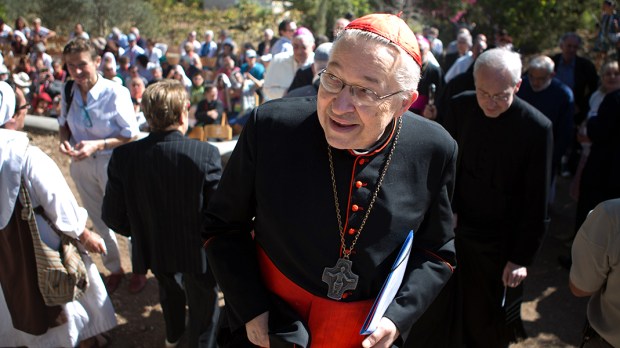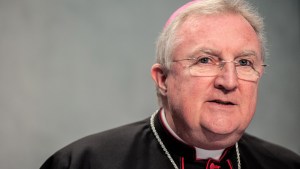Wednesday, August 31, 2022
1. A priest warns against the temptation of theocracy in his popular podcast
2. Fifteen years after the death of Cardinal Lustiger, a nod from Pope Francis?
3. In Ukraine, a bishop tells of his priestly mission amid the chaos
A priest warns against the temptation of theocracy in his successful podcast
A priest warns against the temptation of theocracy in his successful podcast
The podcast “The Bible in a Year,” by Father Mike, aka Catholic priest Mike Schmitz, is a huge success on Apple’s podcast platform. His show, which launched in January 2021, has been downloaded a total of 350 million times, or 750,000 times a day. “Its popularity is easy to understand — the show goes down smoothly,” writes the New York Times, noting that each episode, which is 20 to 25 minutes long, includes two or three Bible readings and a short meditation by Fr. Mike. The 47-year-old priest, director of youth ministry in the Diocese of Duluth, Minnesota, has become a celebrity, to his surprise. Faced with the distance of many young people from the Catholic faith, he poses important questions: “Are we letting them ask the questions they have? Are we engaging with the facts of their lives and trying to offer what the Catholic Church and Christianity has to offer?” Stressing “the intrinsic worth of all human life,” he calls for concrete help for struggling mothers and their children rather than fighting only on the level of abortion legislation. Opposed to any tendency towards theocracy, Fr. Mike believes that “government of the people, by the people” means that “all of us get a say. From the deeply religious to the convicted atheist and everyone in between.” In his preaching, he doesn’t want to impose anything. “Let’s present principles and, trusting people, apply them as best we can,” he explains.
New York Times, English
Fifteen years after Cardinal Lustiger’s death, a nod from Pope Francis?
August 5 marked the fifteenth anniversary of the death of Cardinal Lustiger, who was archbishop of Paris from 1981 to 2005. A great pastor and brilliant intellectual, he came from a Polish family that had emigrated to France. This great friend of John Paul II was Jewish, the son of a Jewish mother who died in Auschwitz. “During these times of an overwhelming succession of scandals, it is only healthy and right to remember figures of the Catholic Church, such as Lustiger, who have left an important mark as doers of good and great ecclesiastics,” writes Religion Digital, which highlights the quality of the French cardinal’s homilies. The cross of this great preacher was the deterioration of his voice at the end of his life, which made him lose his aura of “papabile” during the conclave of 2005. “For a man of words, sermons, and spoken meditations, it’s striking that his serious illness damaged his vocal cords, making his words inaudible. A mystery of life and a mystery of death!” the Spanish site writes. But Cardinal Lustiger left a deep imprint on the life of the Church, in Paris as well as in Rome. The presence of the commission for relations for Judaism within the Dicastery for Promoting Christian Unity, provided for by the constitution Praedicate Evangelium promulgated by Pope Francis, is effectively—according to the author of the article—a legacy of the French cardinal.
Religion Digital, Spanish.
3. In Ukraine, a bishop tells of his priestly mission amid the chaos
Bishop Pavlo Honcharuk is the bishop of the Latin diocese of Kharkiv-Zaporizhzhia, a city of nearly 1.7 million people now located approximately 12 miles from the front line. In this interview with Aid to the Church in Need, the bishop describes the tragic situation of the inhabitants of his region. He tells us about the daily life of families separated by the war. “I met a soldier who from his position at the front line can see his home through binoculars. His wife and two children remained (there), under occupation. Every day he can see his wife and children from a distance, but he has no contact with them,” he explains. In the midst of the chaos, the bishop emphasizes that the war “removes the veil from the deep longing for God.” He cites this example: “In the hospital I visited a couple who had lived together for 60 years, we prayed together, and afterwards the husband said it was the first prayer in his life, and it filled him with joy. Three days later I learned he had died. His wife told me that in all those years she had never seen him so happy. She was very grateful. The man was in disbelief all his life but three days before his death, he met God.”
ACN, English


